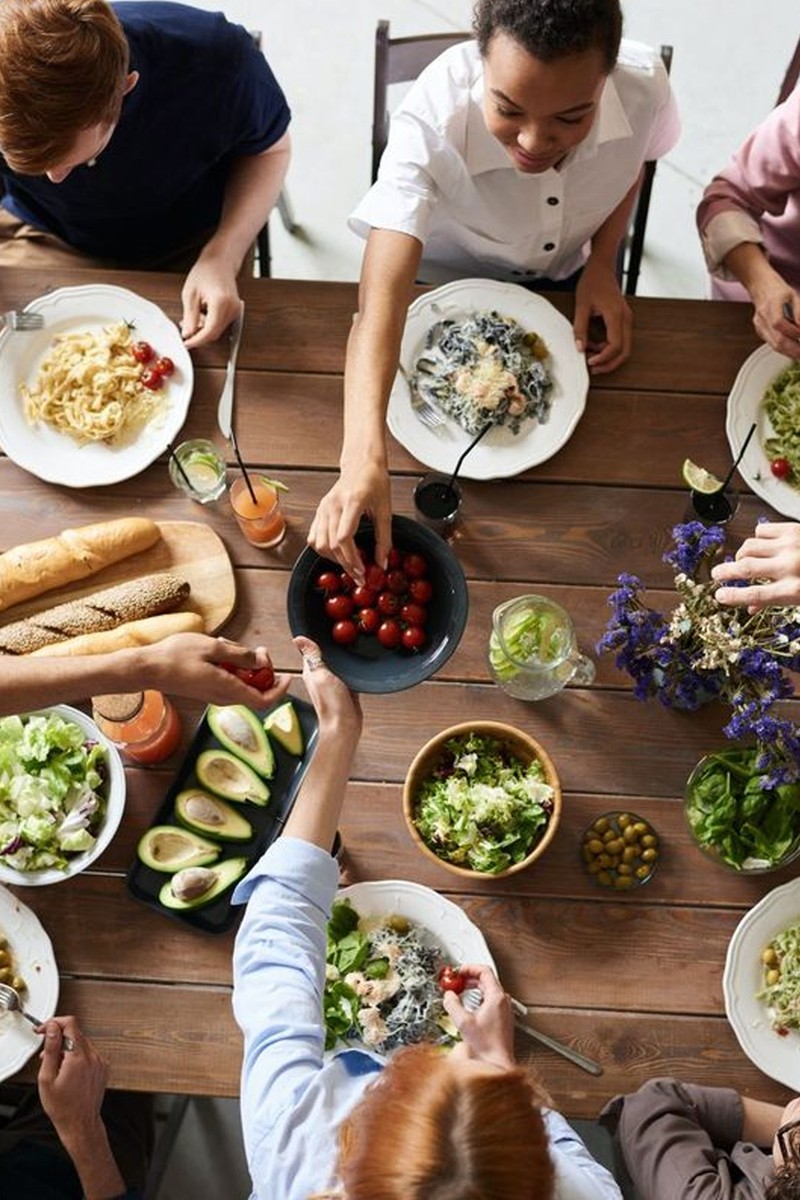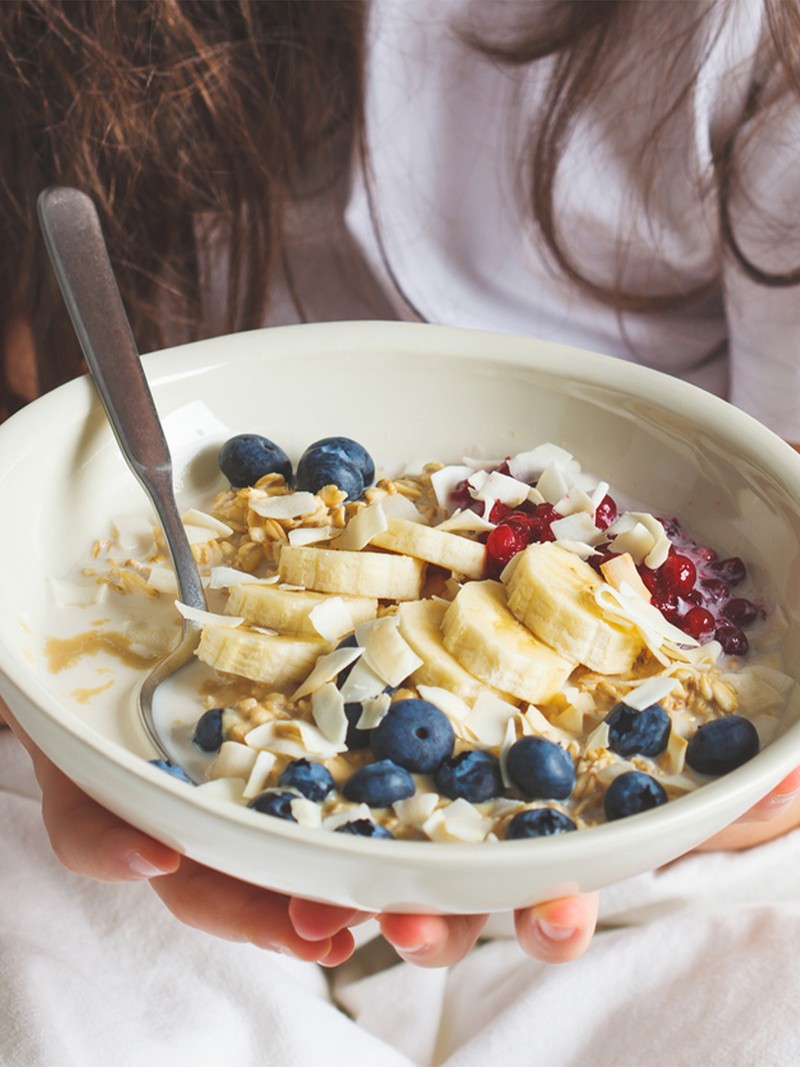14 Healthy Eating Tips To Help Your Teenager Thrive
Prioritise Nutrition To Fuel Physical Changes
“Teenagers require more nutrients than at any other time in their lives. It’s a time of rapid physical and mental growth, often characterized by intense physical activity, brain development, and hormonal changes. These factors create increased nutritional demands, making it crucial to provide the body with the right nutrients to support overall health and well-being. Teenagers seem to have boundless energy and appetites, but beneath the surface their bodies are undergoing remarkable changes. Proper nutrition during these formative years provides the building blocks for growth – think of it as the rocket fuel for the journey to adulthood.”
Look Out For Deficiencies
“Although we have an abundance of food and calories in the UK, nutrient deficiencies are still very common, especially among teenagers. In fact, it’s estimated up to 50% of teenagers will have one or more nutrient deficiencies. This stems from a variety of factors, including dietary choices, growth spurts, and the challenges of maintaining a balanced diet during a period of rapid change and development. The most commonly occurring nutrient deficiencies in the UK are iron, magnesium, calcium and omega 3. Detecting a nutrient deficiency in a teenager is like solving a puzzle. Fatigue, pale skin, brittle nails, and irregular periods are just a few pieces of the puzzle. These are the body's red flags signals that it requires specific nutrients.”
Cut Back On Fast Food
“Some of the most common nutrition mistakes I see teenagers making include excessive fast-food consumption, overeating sugary snacks and beverages, skipping meals, lack of portion control and not eating enough fruit and veg. In fact, I’ve lost count of the number of times I’ve seen teens making these nutritional pitfalls, which ultimately create havoc with energy, weight, concentration, sleep, mood and hormonal health. Plus, teens who eat lots of processed foods – especially processed cheese, meat, white bread and bagels – may find they’re constipated more often.”
Build Strong Bones
“Both calcium and vitamin D are crucial for strong, healthy bones. Inadequate calcium intake can lead to weakened bones, setting the stage for future issues like osteoporosis. Both boys and girls need sufficient calcium, but girls should be cautious due to their higher risk. Vitamin D also builds strong bones, although teens may struggle to get enough sunlight or eat the right foods, putting them at risk of a deficiency. Dairy – milk and cheese – is the best source of calcium, but kidney beans, chickpeas, tahini, kale and cavolo nero are also good sources. If your child doesn’t drink dairy, make sure their alternative milk is fortified with calcium. Most are, and many contain added vitamin D and B12 too.”
Don’t Skip Breakfast
“In the teenage years, consuming breakfast is very important, so skipping it or any other occasional fasting is a bad idea. Studies show having breakfast improves concentration and mood, and ultimately academic outcomes. Opt for something that will release energy slowly – overnight oats and pancakes made with eggs, ground flaxseed, coconut flour, banana, cinnamon, coconut oil and milk are good choices.”
Up Her Iron Levels
“Iron is essential to produce red blood cells, but if your teenager doesn’t get enough of it, they may become anaemic, causing them to feel incredibly tired. Girls will also need extra iron to replenish what’s lost during their monthly cycle. A pale complexion, dark under-eye circles, a sore tongue, headaches or dizziness, poor concentration, breathlessness, heart palpitations, brittle nails and fatigue are all signs of an iron deficiency. Vitamin C – found in fruit, fruit juice, broccoli and red peppers – can improve the absorption of iron, so pair foods like red meat, kidney beans, nuts and dried apricots, with a source of vitamin C.”
Load Up On Healthy Fats
“Fats tend to have a bad rep, but healthy fats are an important part of a teen’s diet. They support brain health, keep the skin nourished, make sure you feel fuller for longer, are a great source of energy and help support hormone balance. In fact, did you know that if you take away the water, the dry weight of our brain is 60% fat? Plus, the brain is a very hungry organ, using more energy than any other organ in our brain. If your teenager likes fish, encourage them to eat two to three portions per week, ideally two of which should be oily fish, as well as a handful of mixed, unsalted nuts and seeds daily. Prepare some trail mix so they can carry it around to snack on; toss cashews through stir fries; add pine nuts to salads; chop any nut and use as a crust for fish; or use a nut spread on toast or as a sandwich filling.”

Swap White For Brown Carbs
“Despite common misconceptions, carbs aren’t the enemy. In fact, they’re a teenager’s main source of fuel. They not only keep you feeling energised but can also keep you feeling fuller for longer and stop sugary cravings. Complex carbs can also be a key player in maintaining a healthy weight and keeping mood stable. They are a good source of a substance called tryptophan and when tryptophan enters the brain, more of the happy hormone serotonin is produced and your mood improves. Carbs are also great food for the gut, and a happy gut makes more happy hormones.”
Try The Mediterranean Diet For Better Mood
“What we call a ‘Western’ diet – the sort of diet that many people eat in the UK – is associated with a higher risk of depression, as it causes low-grade inflammation in the body. A Mediterranean diet, on the other hand, reduces inflammation and therefore improves mood. Consuming a variety of fruits and vegetables – like leafy greens, citrus fruits and berries – is a good place to start, as they contain antioxidants that protect the brain from oxidative stress. Choose wholegrains like brown bread and brown rice to provide a steady source of energy for the brain; fatty fish like salmon and mackerel for brain health; and lean protein like fish, poultry, beans and tofu to support mood and focus.”
Fuel An Active Lifestyle
“Physical activity is the unsung hero in teenage nutrition. It burns calories, builds strong bones and muscles and keeps their brain razor-sharp. If your teen is active, it’s important to encourage a balanced diet and keep timing in mind – encourage them to eat a balanced meal a few hours before exercise and refuel with a small snack afterwards. Teach your teen to listen to their body and hunger cues, eating when they’re hungry to support optimal energy levels. The rule for a healthy plate layout is 50% colourful fruit and veg, 25% protein and 25% complex carbs, although for an active teenager, the balance should be more like 33% fruit and veg, 33% protein and 33% complex carbs.”
Take Care With A Vegetarian Diet
“Vegetarian and vegan diets can be healthy if they are rich in plants and include lots of wholegrains, but they can also lack certain nutrients. By removing all animal products and fish from your diet, you may be lacking in protein, calcium, iron, iodine, choline, omega-3 fats and vitamin B12. You can find many of these nutrients in eggs and dairy if you’re vegetarian and in fortified products if you’re vegan. Some meat replacement and vegetarian or vegan food products are highly processed, so always read the label and avoid foods that are overly processed. Taking a vegan multinutrient and algae-based omega-3 supplement can protect your teen from deficiencies, and perhaps encourage them to go 80% plant-based, which is easier to achieve from a nutritional perspective.”
Eat The Rainbow
“The colours we see in plants are called phytonutrients, and they represent a variety of beneficial compounds. By eating all the colours of the nutrition rainbow, you’ll harness these power-packed foods. The more naturally occurring colours on their plate at each meal or snack, the better. Breakfast could be a smoothie packed with fruit and veg; oats topped with red berries; or an omelette filled with red peppers, mushrooms and spinach. Make vegetables the star of the show at lunch with soup or a large, colourful salad. Also encourage your teen to aim for 30 different plant foods each week – this includes fruits and veggies as well as nuts, seeds, herbs, spices and wholegrains like brown rice. Try making smoothies with frozen fruit; buy bagged salad with different leaves; or try a granola like Bio&Me, which offers 15 different plants in one portion.”
Strike A Balance
“Although we eat for nourishment, food should also be pleasurable and enjoyable, meaning you don’t need to make 100% healthy food choices all the time. In fact, an 80/20 approach is something I’d recommend, encouraging your teen to make healthy choices 80% of the time, leaving the remaining 20% for treats and less-healthy options. Being able to eat everything, in moderation, leads to a happy and balanced relationship with food and body image. Remember that your influence as a parent also plays a role in shaping your teen’s eating habits. By creating a supportive and educational environment, you can help them develop a lifelong appreciation for nutritious foods. Don’t be too worried about what they are eating outside of the home as studies show that children learn many of their core behaviours around food from the home environment.”
Encourage Independence
“If your teen is eager to make healthier food choices on their own, whether at home or out with friends, teach them it’s all about awareness. Balance is key – strive for balanced meals that contain lean protein, wholegrains, fruits, vegetables and healthy fats; and pay attention to portion sizes to avoid overeating. Practicing mindful eating is also important – eat without distractions like the TV or phones, which will help you enjoy food and recognise when you’re full. Opt for water, herbal teas or unsweetened drinks instead of sugary sodas or energy drinks and learn to read nutrition labels to make informed choices about packaged foods.”
For more from Tina visit TheNutritionGuru.co.uk & ReviveActive.com. Buy her new book, Eat Well and Feel Great, here.
DISCLAIMER: Features published by SheerLuxe are not intended to treat, diagnose, cure or prevent any disease. Always seek the advice of your GP or another qualified healthcare provider for any questions you have regarding a medical condition, and before undertaking any diet, exercise or other health-related programme.
DISCLAIMER: We endeavour to always credit the correct original source of every image we use. If you think a credit may be incorrect, please contact us at info@sheerluxe.com.

/https%3A%2F%2Fsheerluxe.com%2Fsites%2Fsheerluxe%2Ffiles%2Fwebsite-images%2F2025%2F04%2Fnew-parenting-background-image.jpg?itok=au3AjSlw)